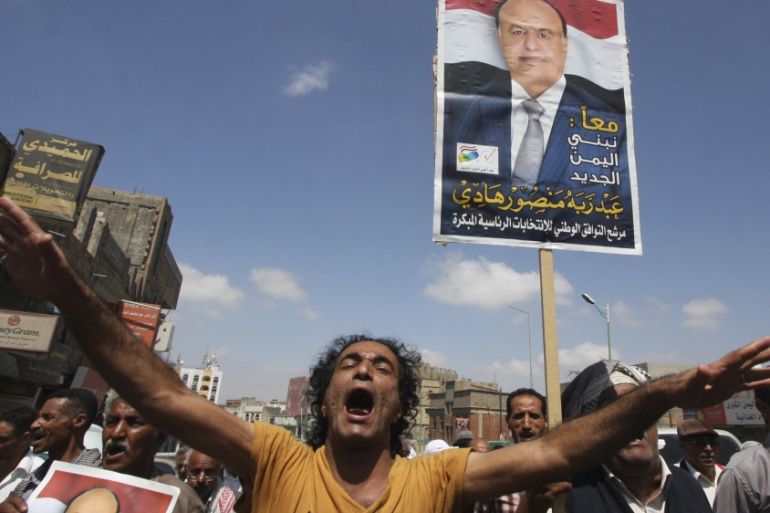Hadi’s comeback a game changer in Yemen
Former president’s return to the political scene could undermine the Houthis’ seizure of power, analysts say.

Aden, Yemen – The sudden departure of Yemen’s former president from Houthi-controlled Sanaa is likely to be a game changer in the country’s troubled political scene, analysts say.
Abd-Rabbu Mansour Hadi, who managed to slip away after a one-month-long house arrest in Sanaa on Friday night, is now in Aden and could undermine the Houthis’ seizure of power.
Keep reading
list of 4 itemsHouthis say they will target Israel-bound ships anywhere within their range
How will Iran respond to Israel’s attack on its Damascus consulate?
US sanctions shipping firm accused of links to Iran, Yemen’s Houthis
“Hadi’s departure from the capital means the transfer of the head of the state from Sanaa to Aden,” Fatehi Bin Lazerg, the editor of Yemeni newspaper Aden Al Ghad, told Al Jazeera. “Ministers can follow him and they can form a government in Aden. Hadi can turn Sanaa into another unproductive Saada.”
Upon his arrival in Aden – Yemen’s second most important city, where armed popular committees loyal to Hadi hold sway – Hadi issued a statement defiantly condemning the Houthis’ seizure of the capital and calling upon the country’s armed forces to stand by him. “[Hadi] salutes the great Yemenis who rejected the coup and all false measures that aimed at confiscating their will of building the state of law and order,” the statement said.
RELATED: Analysis: What went wrong in Yemen?
The Houthi rebels broke into the presidential palace and Hadi’s house a month ago, prompting him and the entire cabinet to resign. The rebels put Hadi and some ministers under house arrest.
Analysts say Hadi holds many cards that could undermine the Houthis’ seizure of power, should he challenge them. “Hadi can divert all state revenues from oil and taxes to the central bank in Aden,” Bin Lazerg said.
When we met during Hadi's house arrest, we were trying to find solutions to the power vacuum. Now, Hadi turned the table and regained his legitimacy after withdrawing his resignation.
Local authorities in the oil- and gas-rich provinces of Hadramout, Shabwa and Maareb have already thrown their weight behind the “legitimate” president. Shortly after his resignation, hundreds of popular committees loyal to Hadi were deployed in Aden and took control of some key government institutions in the strategic city.
At the same time, Hadi’s brother, Nasser Mansour Hadi, who is in charge of the political security apparatus of Aden, Laj, and Abyan, co-chaired a security committee meeting in Aden that strongly rejected the Houthis’ siege on Hadi and ordered security and army bodies to sever ties with Houthi rebels in Sanaa.
According to the constitution, the president’s resignation from office is only valid after parliament conducts a voting session to accept or reject it.
In this case, analysts note, Hadi resigned under gunpoint and could theoretically withdraw his resignation, since the parliament has not voted on it.
Although the Houthis have said Hadi’s comeback will not impact the political process, other political actors who took part in UN-brokered talks say it could shift the dialogue.
“When we met during Hadi’s house arrest, we were trying to find solutions to the power vacuum. Now, Hadi turned the table and regained his legitimacy after withdrawing his resignation,” Ali al-Sarari, the Socialist Party representative in the dialogue, told Al Jazeera.
He added that the participants would have to re-examine the issue in a new round of talks scheduled to take place on Sunday.
The Houthis’ quick defeat of Hadi’s forces left many observers questioning the president’s leadership. Hadi came to power in 2012 in an uncontested election months after the departure of the country’s long-serving president, Ali Abdullah Saleh.
Saleh was forced out of office following nationwide popular protests. Hadi had served as Saleh’s deputy since the end of the civil war between southern and northern Yemen in 1994.
But tensions between Hadi and Saleh surfaced when Hadi began purging Saleh’s relatives from the military in a major shake-up. The relationship worsened last year when the UN imposed a travel ban and sanctions on Saleh for undermining the political process in Yemen. Hadi was blamed for the sanctions, and as a result, Saleh sacked him from the party leadership.
|
|
Bin Lazerg said that due to Hadi’s tense relationship with Saleh and other leading forces in Yemen, he was left alone to confront the Houthis’ attack on the presidential palace and his house last month.
“Hadi had failed to gain the allegiance of powerful tribal leaders and military officers in the north,” Bin Lazerg said. “Those [northern] figures deemed Hadi as an outsider and they remained part of the deep-rooted, Saleh-controlled state. Saleh and his party accuse Hadi of sidelining them during the transitional political process.”
Hadi’s relationship also worsened with al-Islah Islamist party in 2014, when the Houthis seized the northern Amran province and killed an army general loyal to the party. The party said Hadi did not send enough reinforcements to rescue the besieged general and his brigade. But according to one analyst, “Islah recently supported Hadi because he is part of the legitimacy of [the] GCC-brokered deal that brought them to power.”
Despite hailing from the south, Hadi could not establish a rapport with the hard-core factions of the Southern Movement that call for the secession of southern Yemen. The pro-independence southerners have frequently taken to the streets to reject Hadi’s decisions aimed at appeasing anger in the south.
On Sunday, Ali al-Saadi, a leading figure in the Southern Movement, told Al Jazeera that they welcomed Hadi’s “comeback” to Aden, but warned him against opposing their demands of independence for south Yemen.
“We seek independence and liberation of the south,” Saadi said. “Hadi will be a loser if he tries to oppose our peaceful approach towards independence.”